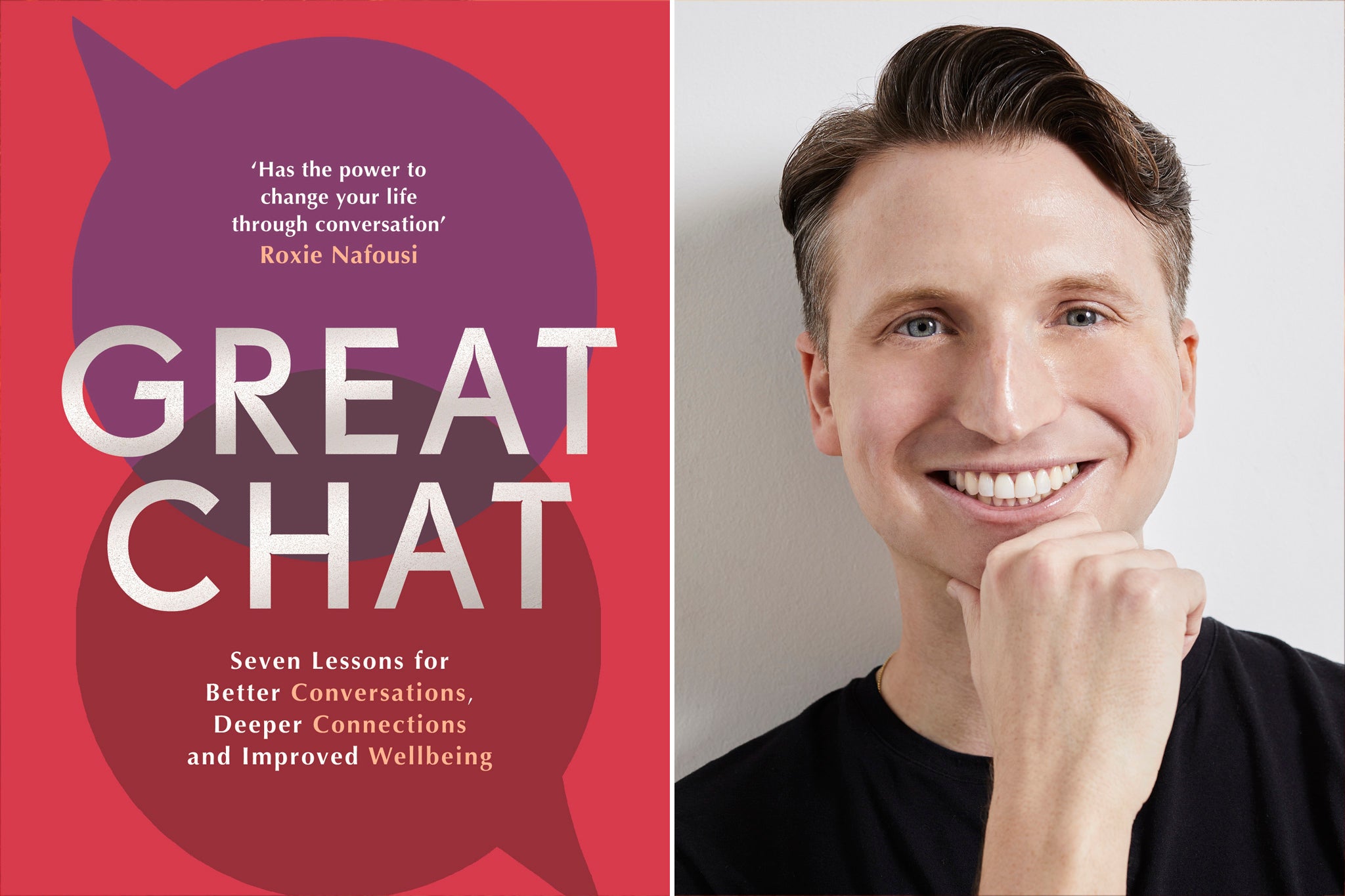How to become socially fit and have a good conversation with absolutely anyone
Josh Smith went from having a speech impediment and being bullied at school to making communication his whole career. He shares his tips on mastering the art of conversation

I talk for a living – and what no one really knows is that it hasn’t always been easy for me to communicate. As a child I had a debilitating speech impediment. I can still hear the dinner lady laughing in my face when the five-year-old me asked for fish fingers, but couldn’t get the words out. I still feel sad for the five-year-old Josh who was too shy to say almost anything at all.
Seeing the effect this had on me, my parents took me to a speech therapist. After months of working on my “th”, “f” and “ph” sounds they became passable – if you listen carefully I still can’t say them perfectly. I got my confidence back, but then as a teenage boy I faced a new challenge – my voice didn’t sound like other boys. Everyone else’s voice dropped. Mine didn’t and I became a target for homophobic bullies who teased me mercilessly just as I was still trying to figure out who I was. I shrank inside myself all over again. “If they say I am disgusting, unattractive and unlikeable, then maybe I should hate myself too.”
So, no one is more surprised than me that, now, 10 or so years on from those darkest days, I have found my voice quite literally. My job is interviewing celebrities, and I have talked to hundreds from every walk of life and mood – from Victoria Beckham to Oprah.
I host my podcast, Reign with Josh Smith and I can now walk into a room full of strangers and flex my small talk as easily as I can take to the stage and present to hundreds of people. Five-year-old me would never have believed any of that was possible.

If there is one thing my life and work have taught me it’s this: we all have the power to be able to speak to anyone once we commit to mastering the art of conversation in an intentional way. And as rates of social anxiety soar in an era where loneliness is a very modern epidemic, it is the one thing that can help.
“Technically” we are more connected than ever, but studies have shown people who spend more time online – whether that’s on their phones or the internet in general – will have increased levels of depression or social separation.
We might also see people be brilliant on Zoom, witty on WhatsApp and flirtatious on dating apps, only to meet them in real life and find out they have zero ability to converse in real life. And god forbid we pick up the phone to resolve a discussion – we much prefer to passive-aggressively send multiple messages via Slack because we are so out of practice with being with people who disagree with us.
Being socially nervous is something, ironically, which bonds us, not divides us. I have previously struggled with social anxiety and loneliness; growing up in the middle of the Cambridgeshire fens, self-loathing was a pastime of mine for years. If I didn’t even like myself, why should anyone else?
Self-doubt is being exacerbated by digital-first communication that encourages us to show off our best selves, increasing the shame about those parts of us that don’t feel up to par. Comparison is the thief of joy, remember, which goes a long way to explain why those hooked up to their phones like IV drips are so miserable.
Scrolling through social media with its unrelenting march of filtered images means an obsession with perfectionism is seeping into our ability to show who we really are to others. So many times I have been so quiet at work, but I’ve been so anxious that people will see it as a sign my career might be nose-diving, I’ll claim to be “so busy babes”. I see so many of my generation pushing the perfect storyline and hiding the “imperfect” bits – relationship struggles; loneliness and anxiety. It is only by starting to be honest about how we are feeling we can start to truly connect.

But we aren’t actually talking to one another and we have fewer friends than we did 30 years ago, and close to half of us now report having fewer than three close friends. Offline we now treat our social lives like an algorithm as we choose to only interact with those like us, those we agree with and people of our own age, which means our emotional intelligence is dimming as we can’t handle those who don’t see the world through our eyes and filters.
Cross-generational conversations are a thing of the past as a result, and people have decided not to listen before others speak a single word. One in five Gen-Zers, for example, haven’t had a conservation in their workplace over the last year with someone over the age of 50.
This is a disaster for the art of conversation, and a lack of conversation is a disaster for our health.
Loneliness is as bad for your health as smoking 15 cigarettes a day. Social isolation is thought to be a greater health problem than obesity. Increasing your social connections, meanwhile, can reduce your risk of early death by 50 per cent. The smallest of talk can have a huge impact on our wellbeing and even gossip releases hormones like serotonin – which helps regulate your mood as well as your sleep, appetite, and even memory – and oxytocin, which is essential for building strong bonds in your life. And every conversation you have can have a positive social ripple effect – it doesn’t just boost the person you are speaking to, or yourself, it will change the way you both interact with people going forward during that day and beyond.
If you ever feel nervous walking into a room full of people, remember that someone there might have life-changing advice for you. Everyone is a teacher or a lesson
No matter how anxious or nervous you might be, mastering the art of conversation is about putting the effort in. A new study from the University of Sussex and the University of Pennsylvania shows that if you are socially anxious, regularly approaching new people over the course of just one week will start to alleviate your fears of chatting, and you will start to realise that interactions are far less awkward and more rewarding than you think.
It’s why I have written a book of my rules for how to have a great chat with absolutely anyone, wherever you are. Here are my top tips:
Think first impressions
It takes seven seconds to make a first impression on someone, and without a positive first impression you won’t get anywhere. But this isn’t about what you’re wearing, or even what you say – it’s about how you make others feel.
Just remembering someone’s name shows you value them. Body language is important – make sure your body appears open, welcoming and in turn people will mirror your body language. If you are nervous, adopting confident body language can help you fake it until you make it, too. So pull those shoulders back, put that back up straight and go get them. And make sure your voice sounds alive by varying your pitch, as a downbeat voice blocks connection. Treat those first impressions like a mindful practice from the word “hello”.
Show interest in others
I have encountered so many people of all generations in all kinds of situations, from family gatherings to small dinners and even networking events, who simply do not ask anyone else a question. It never fails to amaze me.
Showing an interest is proven to make you more likeable. But choose your questions wisely, and don’t get personal too quickly, especially when you are meeting for the first time. “Do you have children?” can be loaded. Keep the questions open and fun so people feel safe to positively open up about their life in a way they see fit.
Be an active listener
Many of us listen with the intent to reply, not to understand what people are actually saying. So pledge to listen twice as much as you talk. Force yourself to pay full attention to the person in front of you – do maintain eye contact and use verbal affirmations such as “I see”, and “I understand”. Don’t interrupt or offer unsolicited advice. And put your phone away.
Be honest
If you ever feel nervous walking into a room full of people, remember that someone there might have life-changing advice for you. Everyone is a teacher or a lesson.
Everyone has something to say and a story, and when you tell it to the right people, in the right environments, where you feel safe, the result can be transformative for you and them.
Embrace difficult conversations
Many of us are so fearful of difficult conversations we avoid them altogether or don’t know how to interact with someone we disagree with without shouting over them to make our points.
If someone is cutting you off, and you gave them the space to share their thoughts, politely and calmly say, “I just want to finish what I was saying before we come back to your point.” You might still disagree at the end but the aim is to have come to a place of understanding.
Remind yourself it is never going to be perfect, too. Admit to yourself and others you might be nervous and acknowledge you might not get it right, but treat everyone with the same respect and give everyone your time – that person could be your next lover, friend or boss.
Lastly, we can all be guilty of relying on others to make the effort in conversation, but you can’t rely on everyone else. You are truly your greatest asset and showing up as yourself makes you more likeable and socially attractive. People are drawn to authenticity like a magnet, it creates better conversations and proves your internal and external critics wrong, every time.
‘Great Chat: Seven Lessons for Better Conversations, Deeper Connections and Improved Wellbeing’ by Josh Smith is published by Lagom, £16.99
Join our commenting forum
Join thought-provoking conversations, follow other Independent readers and see their replies
Comments
Bookmark popover
Removed from bookmarks